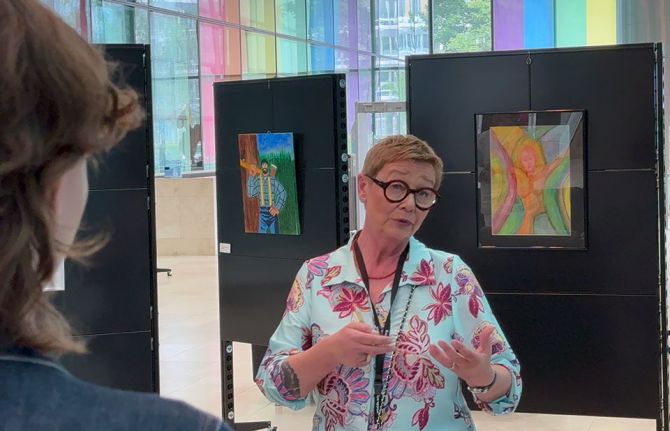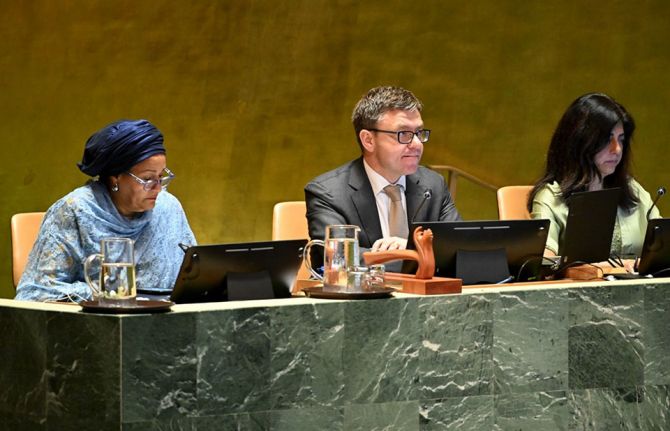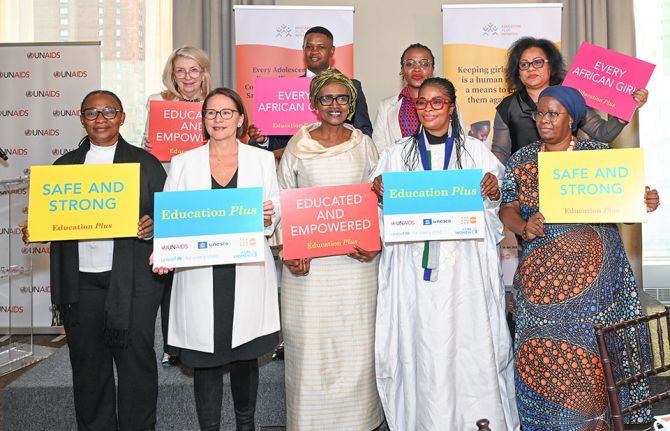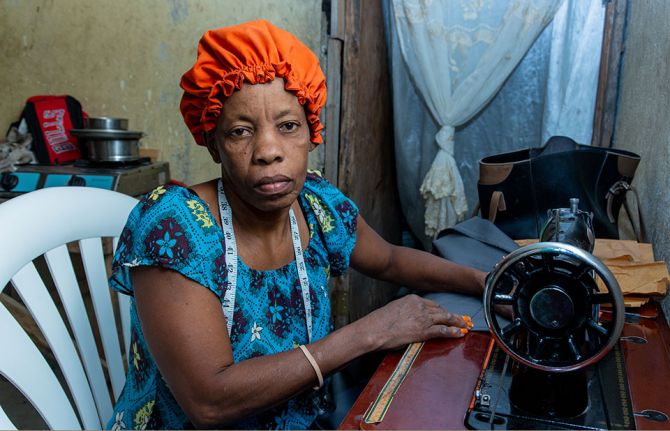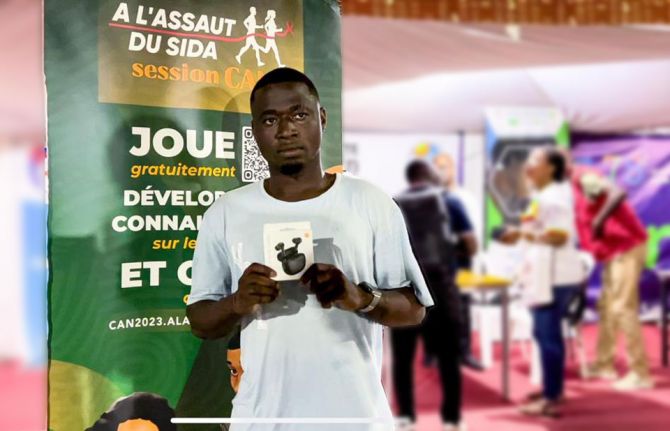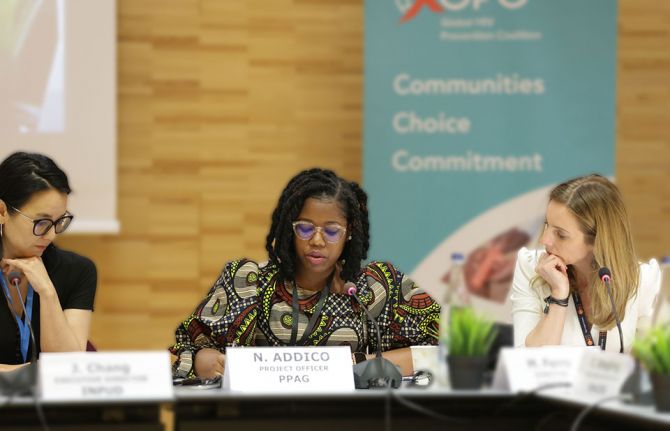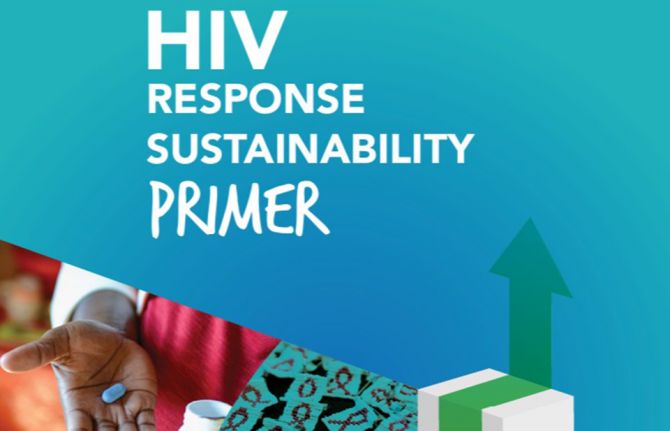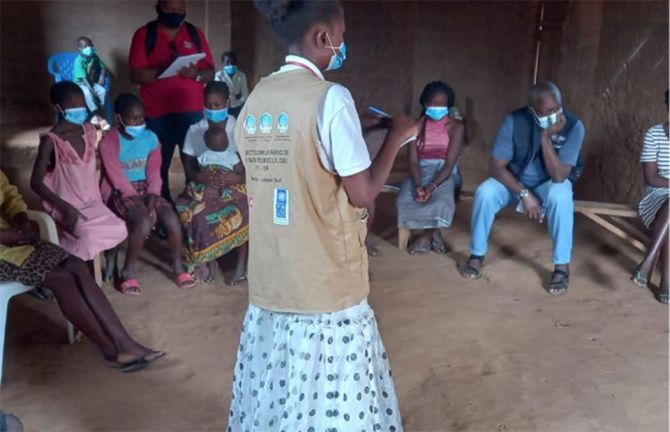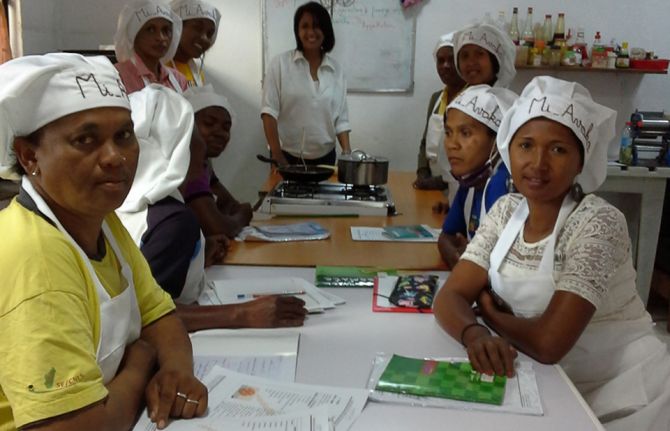
Feature Story
UNAIDS Executive Director addresses US academia on AIDS
20 septembre 2007
20 septembre 2007 20 septembre 2007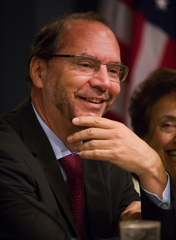
Dr Piot noted the leadership role that
has been played by the United States
in addressing the global AIDS
epidemic. Photo credit: H. Fancher
UNAIDS Executive Director Peter Piot participated in a forum at the Woodrow Wilson International Center for Scholars in Washington, D.C., discussing the United States’ important role in the global AIDS response and the upcoming reauthorization of the U.S. President’s Emergency Plan for AIDS Relief. U.S. Representative Nita M. Lowey and Kent R. Hill of the U.S. Agency for International Development also spoke at the forum.
During his speech, Dr Piot noted the leadership role that has been played by the United States in addressing the global AIDS epidemic, and called on the country to maintain and strengthen this commitment. “We must accelerate our efforts, and broaden them—by bolstering our long-term, sustainable efforts to fight this disease,” he said. “For the United States in particular, that means sustaining the leadership role you have played in recent years. Your investments have had powerful results for many people around the world. We need your leadership to continue – and intensify – on all fronts.”
The UNAIDS Executive Director is in the United States to speak with leaders from government and civil society about the state of the global AIDS epidemic and role U.S. organizations can play in the response. On Tuesday 18 September he addressed students and faculty at Washington D.C.’s Howard University. Next week he will give the keynote speech at a symposium on children and AIDS at Harvard University Medical School.
Links:
Read Dr Piot's speech at Harvard University Medical School
Read Dr Piot's speech at the Woodrow Wilson International Center for Scholars
Watch webcast of the event
Listen to the interview to Dr Piot by the Woodrow Wilson International Center for Scholars
See archived presentations by Dr Piot at the Wilson Center
Read more on Dr Piot's intervention at Howard University
Related
 UNAIDS is awarded the Science and Medicine Award at the 25th Annual Steve Chase Awards
UNAIDS is awarded the Science and Medicine Award at the 25th Annual Steve Chase Awards

12 février 2019
 AIDS care in the Californian desert
AIDS care in the Californian desert
12 février 2019
 Call for a broader vision for harm reduction
Call for a broader vision for harm reduction

09 novembre 2018

Feature Story
The role of academia in the global AIDS response
19 septembre 2007
19 septembre 2007 19 septembre 2007
Howard University’s hospital was the first in the
United States to routinely offer HIV testing to all
patients.
The important role of academic organizations in the global AIDS response was underlined on Tuesday 18 September in a special lecture given at Washington D.C.’s Howard University by UNAIDS Executive Director Dr Peter Piot.
Addressing students, faculty, community members and journalists, Dr Piot praised Howard University for its commitment to confronting HIV in Washington, D.C. – one of the areas most affected by AIDS in the United States, with approximately one in twenty of the city’s residents living with HIV.
“This university has done so much to raise awareness to unmet needs at every level of society – and you have been a great partner in the global fight against AIDS. Faculty and students at Howard are addressing HIV on multiple fronts as scholars, scientists and activists,” said Dr Piot. “The world must follow your example. That is the only way we will ever get ahead of this epidemic,” he added.
Howard University’s hospital was the first in the United States to routinely offer HIV testing to all patients; its law students run a legal clinic for people living with HIV; and the university recently convened a conference on the global AIDS response.
In his speech, sponsored by the National Minority AIDS Council, D.C.-based AIDS service organization the Women’s Collective, and Howard’s Student Health Center and Women’s Health Institute, the UNAIDS Executive Director also highlighted the important role of the United States in funding the global AIDS response.
“PEPFAR [the United States’ President’s Emergency Plan for AIDS Relief] enabled us to make a quantum leap forward against AIDS,” Dr Piot said. “With PEPFAR, the global discussion about responding to AIDS stopped being about ‘millions’ and started being about ‘billions.’ PEPFAR runs out next year, giving the United States a unique opportunity to continue its support of a truly global effort.
”Later this week, Dr. Piot will speak at the Woodrow Wilson Center for International Scholars in Washington. He will also travel to Boston to give the keynote speech at a symposium at Harvard University Medical School on children and AIDS.
Related
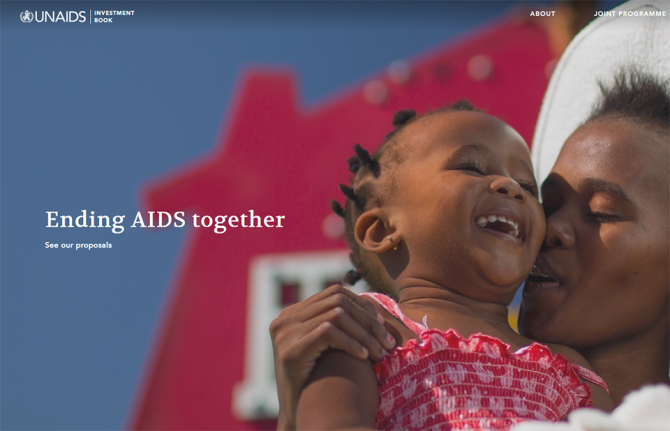 New Investment Book highlights investment opportunities
New Investment Book highlights investment opportunities

13 février 2020
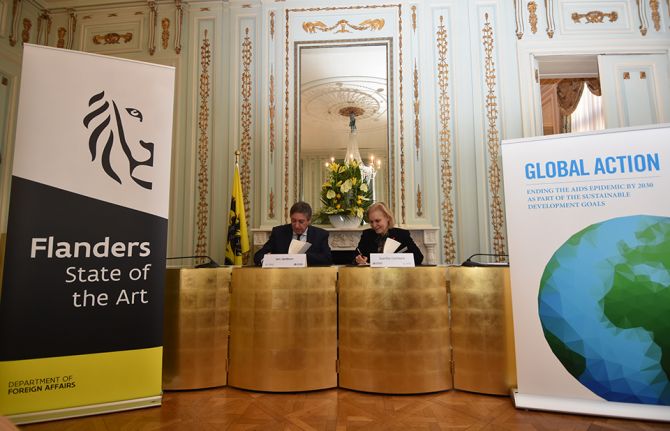 Commemorating World AIDS Day in Belgium
Commemorating World AIDS Day in Belgium
05 décembre 2019

Feature Story
Positive response to AIDS in Ukraine
17 septembre 2007
17 septembre 2007 17 septembre 2007Experience and evidence show that for an effective response to AIDS, it is essential to involve people living with HIV at all levels. Networks of people living with HIV are uniquely well qualified to help unify the response and maximize efforts to reach out to communities as well as influence national policy.
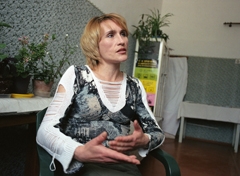
UNAIDS has produced a new report that describes
the background, structure and operation of the All-Ukrainian Network of People Living with HIV, as an example of best practice within the AIDS response.
In order to promote and help replicate the work of associations of people living with HIV, UNAIDS has produced a new report that describes the background, structure and operation of the All-Ukrainian Network of People Living with HIV, as an example of best practice within the AIDS response.
“The All-Ukrainian Network of People Living with HIV has an innovative structure, has undertaken high profile successful advocacy campaigns at both national and local levels and has a strong track record of delivering an ever-expanding array of services to people living with HIV,” the report says. “From the outset, people living with HIV have been responsible for the Network’s very rapid growth and strategic importance in the country’s HIV response.
”Ukraine has the most severe HIV epidemic in Europe, with an estimated 377 600 people living with the virus at the end of 2005. The Network was formed in the late 1990s by people living with HIV alarmed by the rapidly growing HIV epidemic in the country and the lack of resources and support available to them and others living with the virus. Since then, the Network has grown rapidly and steadily from its registration in 2000 to its designation as a co-Principal Recipient of a Global Fund grant to distribute funds for treatment, care and support. In 2006, it provided services and support to more than 14000 people living with HIV.
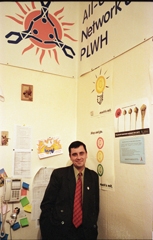
At the national level, the
Network’s advocacy efforts have
resulted in a number of high
profile achievements in recent
years.
The Network was established under four key strategy components: increasing access to non-medical care, treatment and support; lobbying and advocating to protect the rights of people living with HIV; increasing acceptance towards people living with HIV throughout society; and enhancing the organizational capacity of the Network.
Through its local branches and affiliated organizations, the Network provides services to thousands of people living with HIV across Ukraine. It also works with ‘indirect clients’, such as injecting drug users, health-care workers, journalists and law enforcement officials, as part of a broader effort to increase social tolerance, raise awareness about HIV transmission prevention and reduce stigma and discrimination.
More than 20 distinct types of services are offered around the country ranging from transportation and nutrition support to treatment literacy training and child-care facilities. Some local groups may even provide a teacher in instances when real or perceived discrimination keeps HIV-positive children out of public schools.
At the national level, the Network’s advocacy efforts have resulted in a number of high profile achievements in recent years, notably a series of meetings with the Ukrainian President in November 2005, where he committed to take personal control of the government’s response to the epidemic. Furthermore, recent advocacy and awareness-raising efforts at national level include continuing efforts to push the government to increase antiretroviral treatment and HIV testing availability through the public sector; working with the media to publicize issues such as poor service delivery; delays within the Ministry of Health; the high price of antiretroviral drugs; and corruption within the procurement and tendering processes.

Local branches of the Network also initiate smaller-scale advocacy efforts that relate to their local needs.
Local branches of the Network also initiate smaller-scale advocacy efforts that relate to their local needs. For example, one group successfully filed and won a court case defending the rights of HIV-positive parents to maintain custody of their children. In August 2006, another group successfully advocated for the provision of antiretroviral treatment in local prisons. Within two months, five inmates were on treatment and two prisons now also have the capacity to provide CD4 testing.
The Network seeks to form partnerships with as many stakeholders as possible. It currently works with government agencies, international organizations, donor agencies and domestic NGOs. “Although often there are strategic and procedural differences with some of the partners, the Network has refused to break ties even as it lobbies, privately and publicly, for policy change,” the report states.
The Network’s collaboration with international organizations, bilateral donors and civil society groups has consisted of financial support, technical assistance, advocacy collaboration and policy development at local, national and international levels. Although initially the Network was mainly the recipient of the assistance, as it has developed, it has played a growing role in identifying ways to share its expertise and experience.
Underlining the Network’s importance as an example of best practice, UNAIDS Partnerships Advisor Kate Thomson said: “This is a role model for positive networks the world over and provides us with a truly inspiring example of positive people coming together to make a difference in the AIDS response.”
Links:
Download the Best Practice - A Nongovernmental Organization’s National Response to HIV: the Work of the All-Ukrainian Network of People Living with HIV
Read more on Ukraine
Other UNAIDS Best Practice reviews:
Learning from experience
A faith-based response to HIV in Southern Africa
Traditional healers join the AIDS response
Focused AIDS programmes in Asia and the Pacific
Injecting drug use: focused HIV prevention works
Related

Feature Story
Promoting sport and HIV prevention
12 septembre 2007
12 septembre 2007 12 septembre 2007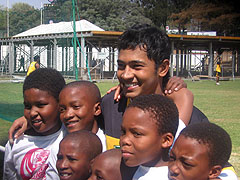
The group of 9- and 10-year-old ‘mini-cricketers’ from
Alexander Township on the outskirts of Johannesburg,
were at Wanderers to meet some of their heroes from
the Bangladeshi cricket team.
“What do you want to do when you grow up?” “Play cricket for South Africa!” the six boys cried out in unison when asked about their future aspirations.
The group of 9- and 10-year-old ‘mini-cricketers’ from Alexander Township on the outskirts of Johannesburg, were at Wanderers to meet some of their heroes from the Bangladeshi cricket team, here to participate in the ICC World Twenty20 2007, taking place in South Africa from 11 to 24 September.
The youngsters are all involved in the sports programme of loveLife – South Africa’s national HIV prevention programme for young people. The programme aims to introduce sport and develop interest and skills of underprivileged children who may not otherwise have the opportunity to play organized sport and instead turn to ‘risky’ behaviours that make them vulnerable to HIV infection. As in all loveLife programmes, HIV prevention messages are integrated into the sporting activities.
“LoveLife focuses on the next generation of South Africans”, said Rudy Van Rensburg, the organization’s outreach coordinator. “Some 95 percent of 15-year-olds in South Africa are HIV-negative currently and it is our responsibility to keep them free of the virus. All of our programmes teach positive living, whether through sport or self-development, motivating them to reach their future potential.
”LoveLife, together with the ICC, UNAIDS, UNICEF and the Kaiser Family Foundation, have joined together in a unique partnership to highlight the situation of children and young people living with and affected by HIV through the global game of cricket.
The Bangladeshi cricket team is the youngest in the international test-playing league, with an average age of only 22. Yet, they have scored a number of impressive successes on the field – most notably the landslide win over top team South Africa at the World Cup 2007. Many put this down to the young age and fearlessness of the players.
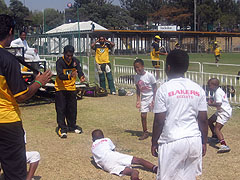
The Bangladeshi cricket team is the youngest in the
international test-playing league, with an average
age of only 22. Yet, they have scored a number of
impressive successes on the field – most notably the
landslide win over top team South Africa at the
World Cup 2007.
“Yes, we are young and maybe fearless because of that,” said 19-year-old wicket keeper Mushfiqur Rahim. “But we’re also very professional and mature when we’re out on the pitch. We are very aware that have a responsibility to each other as teammates and to the nation to do our best.
”This sense of responsibility and leadership are lessons that they, as international cricket players and role models to millions of young people around the world, are keen to pass on to the next generation of ‘mini-cricketers’. They are also qualities fundamental to HIV prevention.
Although Bangladesh has a low HIV prevalence rate compared with other cricket-playing countries, the players are aware that effective HIV prevention is key to keeping the number down and it is particularly important to target children and young people to ensure an AIDS-free generation.
“Young cricket fans look up to us and we have a role to play in teaching them about HIV prevention and how to protect themselves from infection,” added Mashrafe Mortaza, at 24 the veteran of the team. A fast bowler, Mortaza was the world’s top wicket taker in ODIs in 2006. “We are young but take our responsibilities seriously and do what we can to support the HIV and young people awareness-raising campaign of the ICC”. When in India for the World Champion’s Trophy tournament earlier this year, some of the Bangladeshi cricketers filmed HIV prevention public service announcements, as they are doing again here in Johannesburg to be broadcast during the televised Twenty20 matches.

A number of top players from all 12 teams participating
in the international tournament will feature in public
services announcements for the ‘Unite for Children.
A number of top players from all 12 teams participating in the international tournament will feature in public services announcements for the ‘Unite for Children. Unite against AIDS’ global campaign bringing attention to the ways in which HIV is affecting the lives of children and young people everywhere.
Coming off the pitch, the Bangladeshi players stopped to greet the youngsters, asked about their bowling and batting skills, and happily posed for group photos with the excited boys. A few then joined in an impromptu game of catch, testing the professed skills of these future cricket stars.
The normally chatty Molefe Makubela, one of the six lucky boys, was almost without words following this close encounter with the cricket stars. All he could say, over and over again, was “It was very nice, it was very nice’ - a big grin on his freckled face.
Links:
Read more on the ICC Twenty20 World Championships
Read more on Unite for Children: Unite against AIDS
Related
 Cities leading the way to achieving key targets in the HIV response
Cities leading the way to achieving key targets in the HIV response

27 septembre 2023

Feature Story
McCullum backs HIV and AIDS campaign
12 septembre 2007
12 septembre 2007 12 septembre 2007Neil McCullum wears two caps – star cricketer for Scotland on the pitch as well as a physical education teacher.
Squeezing in training sessions and international cricket play when his day job allows, Neil also manages to make time in his busy schedule to support the ICC’s HIV awareness programme by visiting children infected with or affected by the illness.
In Nairobi earlier this year to face for the ICC World Cricket League, Neil together with a number of his team mates paid a visit to a local school for children living with HIV to coach a chosen few in the art of cricket.
The visit was part of the ICC’s partnership with UNAIDS and UNICEF to raise awareness and reduce stigma around HIV and the impact of AIDS on children and young people through the global campaign ‘Unite for children, United against AIDS’.
“We started with a group of six,” related Neil. “But soon more and more children joined in until the entire student body of 60 boys and girls surrounded us, clamouring for our help with their bowling and batting technique!”
Smiling at the memory of the visit, Neil then became thoughtful. “My visit that day was a massive eye-opener to the situation of these children,’ he said. “I was touched by their positive spirit and terrific enthusiasm.” He added: “It was a very moving experience and will remain a lasting memory.”
When he returns to his own students in Scotland, Neil makes a point of sharing his experiences with them to increase their awareness of HIV and to help reduce the stigma often associated with AIDS.
“It is important that young people at home are aware of the disease and of the situation of young people in other parts of the world who may be less fortunate,” explained Neil. “It is important that we come together around this issue and tackle it as a global community. The world must unite against AIDS.”
In South Africa to play in the inaugural ICC World Twenty20 2007, being held from 11 to 24 September, Neil, his teammates and all players of the 12 competing teams will be wearing red ribbons to show their support for children and young people infected with or affected by HIV in nine games of the tournament, including the final, to be televised around the world: ‘Uniting the world against HIV and AIDS.
Links:
Read more on the ICC Twenty20 World Championships
Read more on Unite for Children: Unite against AIDS

Feature Story
“Cricket can help combat HIV and AIDS”, says Graeme Smith
12 septembre 2007
12 septembre 2007 12 septembre 2007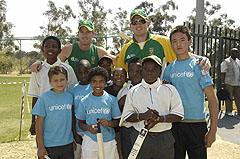
The Proteas skipper Graeme Smith is optimistic about
how cricket can add to combating HIV among children
and young people.
Talking tough to the opponents, Smith, who joins an array of leading cricket icons to aid the “Unite for Children, Unite Against AIDS” global campaign, couldn’t ignore the attention he was getting from scores of children and young admirers during a training session at Johannesburg’s Wanderers Stadium.
“HIV and AIDS are relevant and pressing subjects here in South Africa. As cricketers we command the attention of the public and the media, and we want to use that to try and better the situation for the children and young people,” he said.
He added: “We have an important role to ensure that the message that says children’s rights and needs take prominence in the fight against AIDS reaches all the relevant people.
”Fielding coach Jonty Rhodes joined the skipper in a short coaching clinic for the children. The smiles on the children and how they treasured the autographed miniature bats by the cricket stars left an impression that cricket has touched them in more ways than one.
The “Unite for Children, Unite Against AIDS” campaign stresses the unacceptable levels of HIV prevalence among children and young people. It also makes a call to action to de-stigmatize the AIDS epidemic and shows how the values of cricket are applicable responses to AIDS while giving greater visibility to children living with and affected by AIDS.
The campaign recognizes the power of world class cricket as a platform to raise awareness of HIV and AIDS, especially among children and young people. The ICC World Twenty20 2007, taking place in South Africa in September, is expected to add impetus to the campaign.
The South African cricketers have also recorded video footage, amplifying key messages overarching the “Unite for Children, Unite Against AIDS” campaign as part of the ongoing awareness programme.
The backdrop to the campaign is the staggering numbers of than 1000 children under 15 dying from AIDS-related diseases every 24 hours. So, far more than 15 million children have lost one or both parents to AIDS.
Links:
Read more on the ICC Twenty20 World Championships
Read more on Unite for Children: Unite against AIDS

Feature Story
Aussie stars support loveLife project
12 septembre 2007
12 septembre 2007 12 septembre 2007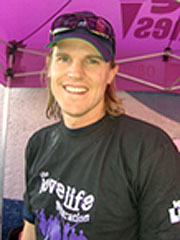
Nathan Bracken said: "By visiting projects
to raise AIDS awareness, hopefully we
can play a role in the ICC's partnership
with UNAIDS and UNICEF to reduce
stigma around HIV.
Nathan Bracken and Brad Hodge took time out of their preparations for the ICC World Twenty20 2007 to visit a project as part of the ICC’s work with UNAIDS and UNICEF to raise awareness on AIDS.
They visited the loveLife Orange Farm Y-Centre, part of South Africa's national HIV prevention program for youth, to meet young people who both volunteer and attend the project.
Nathan Bracken said: "By visiting projects to raise AIDS awareness, hopefully we can play a role in the ICC's partnership with UNAIDS and UNICEF to reduce stigma around HIV. It is important that projects like loveLife provide opportunities for young people to make informed choices about the way they live their lives and help halt the spread of HIV.
"loveLife Y Centres provide hubs for regional networks of franchise holders, adolescent friendly clinics and outreach programs. They serve as best-practice sites for youth leadership development and adolescent clinical services; training venues for groundBREAKER and loveLifestyle programs; and provide trained facilitators to support the loveLife Games and other outreach programs.
Brad Hodge: "Sport is a great way of inspiring young people and teaching them skills which they can use in all areas of their life. It has been very moving to see how loveLife provides opportunities for young people to develop their confidence by taking part in a range of team sports."
Links:
Read more on the ICC Twenty20 World Championships
Read more on Unite for Children: Unite against AIDS

Feature Story
AIDS: everybody’s business
12 septembre 2007
12 septembre 2007 12 septembre 2007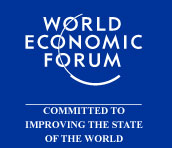
Finding innovative solutions to key health challenges to ensure the long-term economic development of nations worldwide was the focus for business leaders attending the three-day meeting of New Champions. The meeting took place in Dalian in the People’s Republic of China from 6 to 8 September 2007.
The issue of AIDS took a particularly prominent position with a symposium dedicated to how business could contribute to responding to the epidemic. The symposium gathered high-level representatives from government, business, NGOs and international organizations—including UNAIDS Executive Director Peter Piot—to discuss the issue of AIDS in the workplace.
Christine Ockrent, author and Editor-in-Chief of the French television channel France 3,introduced the discussion noting how big business had been slow to realize the staggering impactl of the AIDS pandemic. “AIDS, she said, has become the fourth cause of death in the world and may soon be the third. Eight thousand people die each day from AIDS,” she added.
What role can new business champions play?
As part of his intervention, the UNAIDS Executive Director presented three comparative advantages of the business sector in addressing the epidemic. First of all, he underlined, business has expertise in long-term strategic planning, risk assessment, research, development and marketing. Private companies can also, reach out to millions of people, who would otherwise be out of reach, through HIV in the workplace programmes and workplace programmes also allow proper follow of the beneficiaries. Additionally, he stressed, the business sector has an outreach potential far beyond its own sector and plays a real leadership role in today’s world.
Other speakers at the symposium included Bo Shao, Chairman, Novamed Pharmaceuticals in the People's Republic of China; Raenette Taljaard, Executive Director of Helen Suzman Foundation in South Africa; Sir Martin Sorrell, Group Chief Executive of WPP Plc in the United Kingdom; and Rajat Gupta, Senior Partner of McKinsey & Co. and Chairman of the Board of The Global Fund to Fight AIDS, Tuberculosis and Malaria.
Mr Gupta noted that the case for business was grounded in completely enlightened self-interest. "We need a healthy workforce,” he said.
WPP’s Sir Martin Sorrell added that HIV must be recognized as one of the world’s two global priorities, along with climate change. He cited ignorance and discrimination as major obstacles in the response to AIDS. “Obstacles, he noted, that can be overcome through better education and where New Champions can contribute by using existing services and by inventing new service delivery tools.
”While the business sector offers some examples of innovative partnerships in response to AIDS, most of them are to be found in large multinational companies. Adidas for example has partnered with Marie Stopes International to provide reproductive health and AIDS prevention education to the young, female migrant workers in their supplier factories. But many more such initiatives are needed across the sector.
“Business has a vital role to play in the response to AIDS. The multi-sectoral nature of AIDS presents enormous opportunities for further contributions from business, in its resources, expertise and long-term planning,” said Regina Castillo, UNAIDS' Team Leader of Corporate and Private Sector Partnerships.
Links:
Read WEF press release
Visit the World Economic Forum's web site for more information on the Dalian meeting
Related

Feature Story
Pakistan cricket team talks about HIV prevention
11 septembre 2007
11 septembre 2007 11 septembre 2007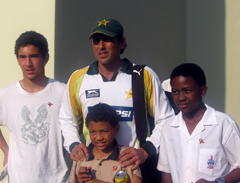
Bats flashing. Balls flying. The three young boys, their fingers intertwined in the links
of the wire-mesh fence, watched mesmerized as some of their cricket idols trained on a pitch just outside of Johannesburg in South Africa.
The Pakistan cricket team had invited the youngsters from loveLife – the national HIV prevention programme for young people in South Africa – to their training session in support of the International Cricket Council’s partnership with UNAIDS and UNICEF to bring attention to the situation of children and young people living with or affected by HIV.
The Pakistan cricket team is among 12 world teams currently gathered in South Africa to play in the inaugural ICC World Twenty20 2007, which is being held at various locations throughout the country from 11 to 24 September.
Coming off the pitch after their practice session, the cricketers took time to sign commemorative bats, take photos – and talk to the young boys about the importance of HIV prevention.
“Be safe. Be strong. Love life!” said Shoaib Akhtar, arguably the fastest cricket bowler in the world and a clear favourite of the young fans.
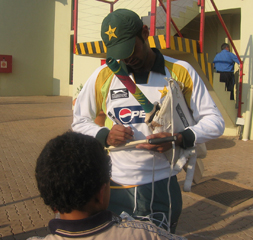
“AIDS is a challenge for all countries in the world, and especially for cricket-playing countries, which are among the most affected by HIV,” added Kamran Akmal. As the AIDS Ambassador for the Pakistani team, Kamran devotes much of his time to HIV-related activities in his home country, spreading the ‘Play safe’ message. “It must be our common goal to defeat HIV.”
Some 40 million people in the world are infected with HIV – nearly 15 million of them living in cricket-playing countries.
Pakistani captain Shoaib Malik was the first player to arrive for the training session and the last to leave – a reflection of his responsibility as team leader. “Being the captain of the team is a difficult job. It means giving 110 percent. But strong leadership is important to the performance of any team. It is also important that we show leadership as role models for young people through the world and we are proud to be part of the ICC partnership with UNAIDS and UNICEF.”
Pakistan stars and other top players, including South African captain Graeme Smith, Kuman Sangakkara of Sri Lanka and India’s Yuvraj Singh will feature in public service announcements for the ‘Unite for Children, United against AIDS’ global campaign highlighting how HIV impacts on the lives of young people. These will be made available to broadcasters in 105 countries across the world as well as being watched by fans on the big screens at the 27 matches during the tournament.
Links:
Read more on the ICC Twenty20 World Championships
Read more on Unite for Children: Unite against AIDS
Related
 Thailand’s Mplus: HIV services delivered in style
Thailand’s Mplus: HIV services delivered in style

13 décembre 2022

Feature Story
AIDS focus at ICC South Africa cricket championship
10 septembre 2007
10 septembre 2007 10 septembre 2007Aussie stars support loveLife project
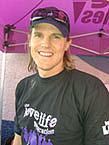
Nathan Bracken and Brad Hodge took time out of their preparations for the ICC World Twenty20 2007 to visit a project as part of the ICC’s work with UNAIDS and UNICEF to raise awareness on AIDS.
“Cricket can help combat HIV and AIDS”, says Graeme Smith

The Proteas skipper Graeme Smith is not only upbeat about victory in the ICC 2007 World Twenty20 but also optimistic about how cricket can add to combating HIV among children and young people.
Promoting sport and HIV prevention

“What do you want to do when you grow up?” “Play cricket for South Africa!” the six boys cried out in unison when asked about their future aspirations. The group of 9- and 10-year-old ‘mini-cricketers’ from Alexander Township on the outskirts of Johannesburg, were at Wanderers to meet some of their heroes from the Bangladeshi cricket team, here to participate in the ICC World Twenty20 2007, taking place in South Africa from 11 to 24 September.
McCullum backs HIV and AIDS campaign
Neil McCullum wears two caps – star cricketer for Scotland on the pitch as well as a physical education teacher.
Squeezing in training sessions and international cricket play when his day job allows, Neil also manages to make time in his busy schedule to support the ICC’s HIV awareness programme by visiting children infected with or affected by HIV.
Pakistan cricket team talks about HIV prevention
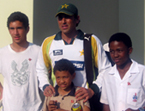
Bats flashing. Balls flying. The three young boys, their fingers intertwined in the links of the wire-mesh fence, watched mesmerized as some of their cricket idols trained on a pitch just outside of South Africa.
Cricket chief and star show AIDS solidarity in India
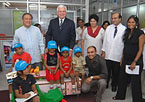
Head of the International Cricket Council (ICC), Malcolm Speed joined Indian star Virender Sehwag and Cecilio Adorna, UNICEF India country representative, in a visit to the Antiretroviral treatment centre of the Kalawati Saran Children’s Hospital in New Delhi at the end of August. The visit was part of the ICC's partnership with UNAIDS and UNICEF to raise awareness and reduce stigma around AIDS and the impact of AIDS on children through the global campaign, UNITE FOR CHILDREN UNITE AGAINST AIDS.
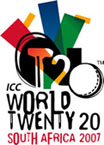
Stars back AIDS awareness campaign at ICC World Twenty20 in South Africa
International cricketers will highlight the situation of children and young people living with HIV as part of a far-reaching AIDS awareness campaign during the 2007 World Twenty20 world cricket championship in South Africa.




